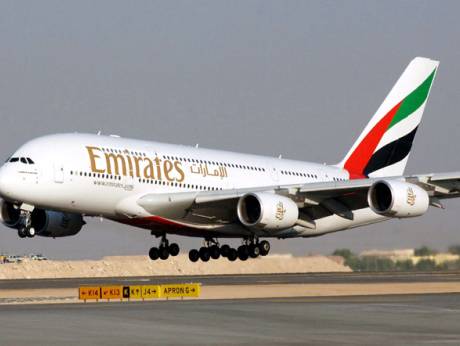Emirates well placed to grow in the long term, analysts say
Dubai
While Emirates is expected to continue facing challenges in the short term due to the tougher operating environment, analysts said the company was well placed to leverage its network and see long-term growth.
The group on Thursday reported Dh2.5 billion in net profit for the financial year ending in March, marking a 70 per cent drop over the previous year. Revenues for the year, however, rose marginally by 2 per cent to reach Dh94.7 billion.
During the year, Emirates Group’s cash balance decreased by 19 per cent to reach Dh19.1 billion, primarily due to the repayment of two bonds on maturity and investments into the airline’s fleet and assets.
That investment value for the year reached Dh13.7 billion, which went to new aircraft and equipment, acquisition of companies, technology and staff initiatives.
Shaikh Ahmad Bin Saeed Al Maktoum, President of Dubai Civil Aviation, Chairman and Chief Executive of Emirates airline and Group, said these investments will strengthen the group’s resilience, and allow it to adapt to the “volatile business climate and fast changing consumer expectations.”
Dnata, Emirates Group’s aviation and travel services unit, meanwhile, reported profits that crossed Dh1.2 billion for the first time, while revenues jumped 15 per cent to reach Dh12.2 billion.
The growth was supported by new acquisitions in the US and in the Czech Republic, in addition to an increase in its shareholding of Oman United Agencies Travel in the Sultanate, according to the Emirates statement.
“Emirates and dnata will stay attuned to the events and trends that impact our business, so that we can respond quickly to opportunities and challenges. We will also progress on our digital transformation journey,” Shaikh Ahmad said.
John Strickland, director of air transport consultancy JLS Consulting, said Emirates has faced a tough year, amid multiple challenges such as travel bans and currency fluctuations. “It is clearly open to reviewing its business model whether that be its approach to on-board service or to the type of aircraft it operates, and that work is already in progress. I’d expect it to keep a tighter rein on its capacity growth in the short to medium term,” he said.
Emirates SkyCargo, meanwhile, accrued Dh10.6 billion in revenues, a 5 per cent decline over the last year, as the airfreight market remained “challenging with fast-changing demand patterns.”
Citing “strong downward trend across the industry and the weakening of major currencies against the US dollar”, Emirates said freight yield per freight tonne kilometre decreased by 8 per cent.
Saj Ahmad, chief analyst at StrategicAero Research, said the financial results show the impact of external events to a good effect.
“The recent visa issues for US travel and the electronics ban are relatively new. However, the strong dollar, price fare reductions by rivals and a low oil price have meant that margins, yield, and by extension, profits, would suffer. However, Emirates is still in the black and has a hugely robust cash balance of over $4 billion, so it is well-insulated to move forward,” he said.
No dividend
Dubai: Emirates Group said that it will not pay dividends to the Investment Corporation of Dubai (ICD) for financial year 2016-2017. ICD is Dubai’s investment vehicle that holds a stake in Emirates. This is the first time since 1996 that the group has not paid dividends to the ICD.
An Emirates spokesperson told Gulf News in an emailed statement the no-dividend policy for this year was “in line with the current business climate and to support the future investment plans of the group.”
The spokesperson said that the group paid no dividends in the initial years of the airline’s founding and in 1995-1996 for similar reasons to reinvest into the business’ future growth.


Comments